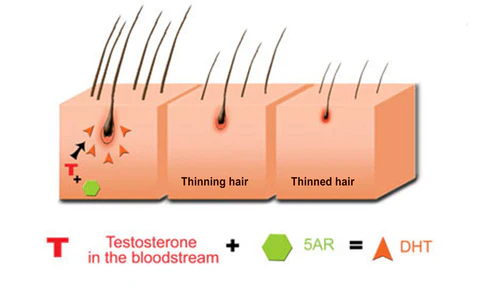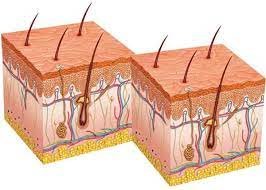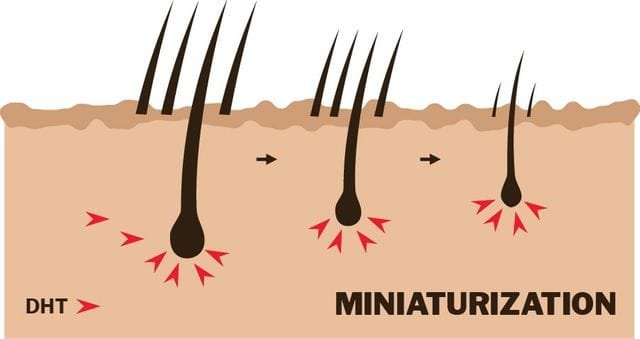
If you haven’t already, we highly recommend starting with our comprehensive guide “Fighting Hair Loss: The First Step is Education, Not Product Purchases.”
The DHT Factor: Understanding the Main Culprit
Dihydrotestosterone (DHT) plays a central role in hair loss through a fascinating yet concerning process. Normal DHT levels typically range between 30-85 ng/dL in adult males and 0-20 ng/dL in females
When these levels become imbalanced, particularly in genetically predisposed individuals, it can trigger progressive hair thinning.
| Gender | Normal DHT Range |
|---|---|
| Male | 30-85 ng/dL |
| Female | 0-20 ng/dL |
ref: DHT (Dihydrotestosterone)
To properly assess your DHT levels and their potential impact on hair loss, you’ll need to request specific blood tests from your healthcare provider. The comprehensive hormone panel should include:
- Dihydrotestosterone (DHT) Blood Test
- Full Blood Count (FBC)
- Ferritin and Iron Studies
- Thyroid Function Tests (TFTs)
- Complete Hormonal Panel including:
- Testosterone
- DHEA-Sulfate
- Estrogen
- Progesterone
When scheduling these tests, it’s important to work with an endocrinologist or dermatologist who specializes in hair loss. They can properly interpret the results within the context of your overall health and family history.

The testing process typically involves a simple blood draw, with results available within 5-10 business days ✅.
Remember that DHT testing is just one piece of the puzzle. Your healthcare provider may recommend additional tests based on your specific symptoms and medical history. This comprehensive approach ensures that all potential contributing factors to your hair loss are identified and addressed in your treatment plan.
Follicles and Hormonal Hair Loss relation
The relationship between DHT and hair follicles represents one of the most studied mechanisms in hair loss science. As Dr. James Hamilton, pioneer researcher in androgenetic alopecia, famously noted: “The sensitivity of hair follicles to DHT is not uniform across the scalp, which explains the characteristic patterns we see in hair loss.”
What does DHT do to hair follicles?
DHT initiates a three-phase attack on susceptible hair follicles. First, it binds to androgen receptors within the follicle, triggering a cascade of cellular events. Second, this binding leads to follicular miniaturization, where the growth phase (anagen) shortens dramatically from the normal 3-6 years to mere months. Finally, the miniaturized follicles produce increasingly thinner, shorter hairs until they eventually stop producing visible hair altogether.
Is blocking DHT good or bad?
Blocking DHT can effectively combat pattern hair loss in predisposed individuals. However, it’s crucial to understand that DHT serves important functions in the body, particularly during male development. Any DHT-blocking intervention should be targeted and done under medical supervision.
How to stop DHT from attacking hair follicles?
Several clinically-proven approaches exist:
- 5-alpha reductase inhibitors (prescription medications)
- Topical anti-androgenic treatments
- Scalp health optimization
- Lifestyle modifications affecting hormone balance
Can you reverse DHT hair loss?
Early intervention is key. While completely reversing DHT-related hair loss isn’t always possible, catching it early and implementing appropriate treatments can stop progression and stimulate regrowth in many cases.
Is rosemary Oil a DHT blocker?
Rosemary oil has shown promising results in clinical studies, particularly the Mielle Organics Rosemary Mint Growth Oil. This product combines rosemary’s natural DHT-blocking properties with scalp-stimulating mint in a carefully balanced formula. The oil has gained significant popularity due to its dual action: it helps inhibit DHT locally while promoting increased blood flow to the follicles.
To maximize the oil’s benefits, we strongly recommend pairing it with a scalp massager for optimal application. Our Hair Scalp Massager guide explains how these tools can enhance product absorption and stimulate blood flow, making them the perfect companion for your hair care routine.
How do you Stop DHT from binding to hair follicles?
The most effective approach combines multiple strategies:
- Topical treatments that create a barrier between DHT and follicle receptors
- Systemic DHT blockers (under medical supervision)
- Natural compounds that compete with DHT for receptor binding
Is caffeine a DHT blocker?
Recent research has shown that caffeine can indeed help counter DHT’s effects when applied topically. It works by extending the hair growth phase and stimulating follicle productivity, though it’s most effective when combined with other treatments.
How to know if DHT is high?
Key indicators include:
- Receding hairline before age 30
- Rapid thinning at the crown
- Increased facial and body hair growth
- Oily scalp conditions
Which vitamin blocks DHT?
Several vitamins and minerals have shown DHT-blocking properties:
- Biotin (Vitamin B7)
- Zinc
- Vitamin B6
These nutrients work through various mechanisms, from directly inhibiting 5-alpha reductase to supporting overall follicle health.
Hormonal Imbalance: The Bigger Picture
Your body’s hormonal system operates like a delicate orchestra, where multiple hormones play crucial roles. Androgens, including testosterone, DHEA, androstenedione, and androstenediol, significantly influence hair growth patterns
- Increased protein synthesis in follicle cells
- Enhanced blood flow to scalp tissue
- Improved nutrient delivery to hair roots
- Stronger hair shaft formation
- Extended anagen (growth) phase

For optimal testosterone balance and follicle health, focus on:
- Regular exercise (especially resistance training)
- Adequate sleep (7-9 hours)
- Stress management
- Proper nutrition with sufficient protein
- Regular monitoring of hormone levels
- Avoiding endocrine-disrupting chemicals
Stress and Hair Loss Connection
Cortisol, our primary stress hormone, significantly impacts hair growth cycles. Research has shown that elevated cortisol levels can push hair follicles into a resting phase, leading to increased shedding.
Studies from Harvard Medical School have demonstrated that stress-related hormonal changes can affect up to 40% of both men and women experiencing hair loss
Current Management Strategies
Modern research has revealed multiple approaches to managing hormonal hair loss. The key lies in understanding the specific hormonal imbalances at play:
- For DHT-related hair loss, 5-alpha reductase inhibitors have shown significant efficacy
- Thyroid hormone optimization has demonstrated positive results in cases of thyroid-related hair loss
- Estrogen therapy during menopause can help maintain hair density in some women
Lifestyle Modifications
The most effective strategies for managing hormonal hair loss extend far beyond basic treatments, encompassing a holistic approach to overall wellness. Our comprehensive guide on lifestyle improvements reveals several key factors that can significantly impact your hair health journey:
- Stress Management Techniques: From mindful meditation to proven breathing exercises that help regulate cortisol levels
- Nutrition Optimization: Strategic meal planning focused on hormone-balancing foods and essential nutrients
- Sleep Quality Enhancement: Science-backed methods for improving sleep cycles that support hormonal balance
- Physical Activity Balance: Specific exercise recommendations that boost circulation without triggering stress responses
- Mental Wellness Practices: Daily routines that promote emotional balance and reduce anxiety-related hormonal fluctuations
- Social Connection: The surprising link between social support and hormonal regulation
- Environmental Factors: How to create a lifestyle that minimizes exposure to hormone-disrupting elements
For a deeper understanding of how these lifestyle modifications can transform your hair health journey, our detailed guide “Top Strategies to Boost Well-being” provides actionable steps and expert insights for implementing these changes effectively. Each strategy is backed by current research and real-world success stories from our community members who have experienced significant improvements in their hair health through these holistic approaches.
The Power of Proper Application
Now that you’ve chosen your perfect treatment products, let’s maximize their effectiveness. One game-changing tool we’ve found is the Scalp Massager. These ingenious devices not only enhance blood circulation but also ensure your treatments reach deep into the scalp without messy hands. Our detailed review covers everything from electronic options to the surprisingly effective jade massagers, which combine traditional wisdom with modern effectiveness.
Next Steps in Your Hair Health Journey
Whether your hair concerns stem from genetic predisposition, scalp tension, or blood flow issues, understanding the hormonal aspect is just one piece of the puzzle. We encourage you to explore our detailed guides on each factor, starting with whichever resonates most with your situationRemember, this journey requires patience and understanding. We’ve seen countless success stories from people who took the time to educate themselves before jumping into treatments. You’re already on the right path by seeking to understand the science behind hair loss



Hi there,
Interested in cutting costs by up to 50% while improving efficiency and simplifying operations?
We have two fully redundant tech centers with more than a thousand agent-positions ready and at your service for:
– Customer Support & Help Desk: Multi-channel voice, text, chat, and email.
– Lead Recovery: Turn abandoned e-commerce leads into new sales.
– Virtual Assistants: Support in finance, healthcare, legal, and more.
– Boost lead generation and schedule sales appointments with Market Outreach.
Partner with us to reduce costs, grow your business, and simplify your workflow.
Book your free consultation now: https://bit.ly/abcmarketinglink
Regards,
C.J. Ebanks
ABC Services Webpage: https://bit.ly/abccorporate
1-866-904-6927
If at any point you prefer not to get any more messages from me, feel free to click on and fill the form at https://bit.ly/removeuspls
Lebzeltergasse 54, Thal, NY, USA, 4502
[…] for your journey towards healthier hair. Just as we’ve explored genetic factors and hormonal influences in our previous discussions, scalp tension is really dangerous in hair health that’s often […]